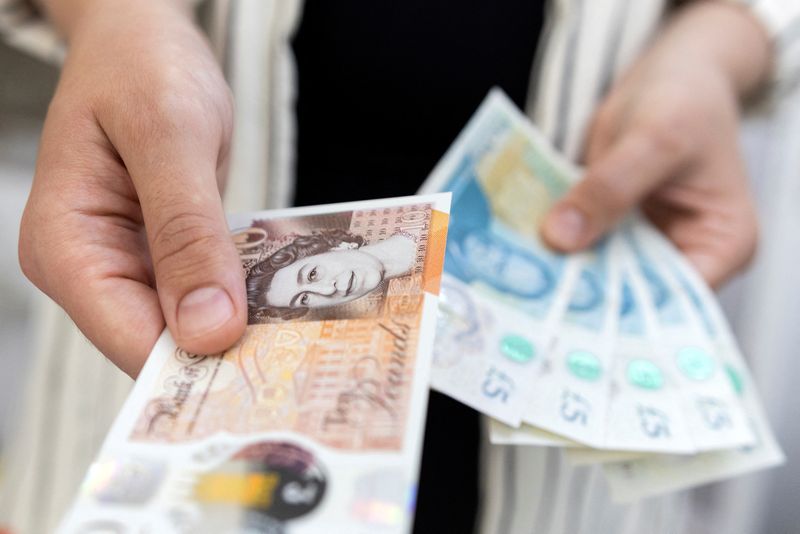LONDON (Reuters) - The pound firmed on Thursday, taking advantage of a rare bit of dollar weakness and the pushing back of expectations of Bank of England rate cuts to drag itself further from Tuesday's five-month low on the greenback.
Sterling was last up 0.17% on the U.S. currency at $1.24755, managing a rare two successive days of gains, after dropping to $1.2405 on Tuesday, its lowest since mid November.
Changing expectations of central banks' rate policies has brought currency volatility back in recent weeks, and, like most currencies, the pound has been a victim of the dollar's strength across the board, as resilient U.S. data and sticky inflation cause markets to give up on earlier expectations of a Federal Reserve rate cut in June.
But there have also been two important data points for the pound this week, which have both led to markets slightly pushing back their expectations for the first rate cut from the BoE, now seen as only just more likely than not in August.
Tuesday numbers showed less of a fall in wage growth than economists had forecast, albeit with a bigger rise in unemployment, and Wednesday figures showed annual consumer price inflation fell to 3.2% in March from 3.4% in February, a slightly smaller decline than expected.
Analysts at Morgan Stanley (NYSE:MS), who still see the BoE cutting earlier than most of their competitors do, pushed back their expectation for the first rate cut from May to June.
"A lot of factors piled up in recent weeks – our US colleagues shifted their Fed cut call from June to July; geopolitical tensions imply higher uncertainty; and the UK data were soft – but not quite as soft as we had expected," they wrote in a note, explaining the decision.
The pound touched its strongest on the euro in a month on Wednesday with the euro down at 85.21 pence after the inflation data, though it has been trading in such a narrow range since February that this is not a sign or enormous volatility.
The heat was then taken out of the pound, which moved weaker on the euro, by a speech late Wednesday from BoE governor Andrew Bailey which said British inflation is broadly declining in line with the central bank's forecasts, and that next month's numbers look on track for a sharp drop towards the central bank's 2% target.

"Our initial read is that this has probably been overinterpreted by markets. Nevertheless, Bailey’s intervention yesterday highlights once again that risks of an earlier start to easing remain," said analysts at Monex Europe.
The pound was last at 85.61 pence per euro, a touch stronger on the day.